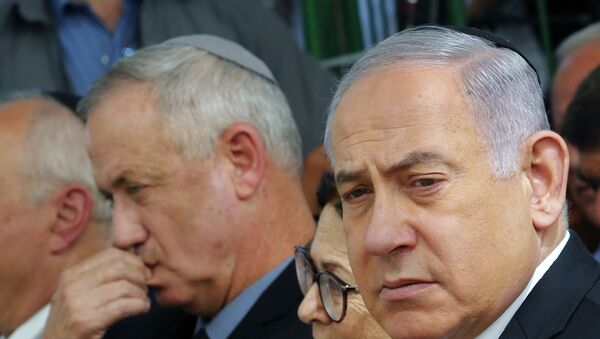After almost two years of unprecedented deadlock, numerous crises, and three elections Israel finally has a government.
Signed between Prime Minister Benjamin Netanyahu and his former rival-turned-ally Benny Gantz on Monday night, the agreement stipulates the division of power between the two, with Netanyahu to occupy the PM's chair first and Gantz taking his seat a year and a half later.
For Gantz that was a personal achievement. "We prevented a fourth round of elections", he wrote on Twitter. "We will guard Israel's democracy. We will fight the coronavirus and we will take care of all citizens..."
מנענו בחירות רביעיות. נשמור על הדמוקרטיה. נלחם בקורונה ונדאג לכל אזרחי ישראל.
— בני גנץ - Benny Gantz (@gantzbe) April 20, 2020
יש ממשלת חירום לאומית.
But it is too early to celebrate. Now that the main obstacles are out of the way, the two will need to overcome a number of challenges for the government to function, the first of which is the division of ministerial posts.
Pleasing All Allies
The unity government is set to have more than 30 ministers and this means that Netanyahu's Likud with its 36 members, who up until now have controlled most of Israel's ministerial jobs, will need to share not only each with other and their allies in the Netanyahu-led bloc, but also with the Blue and White MKs who are supposed to man 16 of these ministerial positions.
Although Likud is supposed to control such key posts as the ministry of foreign affairs (for half of the period) as well as education, transportation, and environmental protection the most prestigious jobs including defence, strategic affairs, justice and absorption, will be in the hands of Gantz.
Netanyahu was aware of the dissatisfaction this situation might cause and was prepared for it. Determined to keep his team pleased and, most importantly, intact, he convinced Gantz to let Likud control key diplomatic positions as well as important Knesset committees that the party holds dear to its heart.
Gantz was quick to agree to the solution, as according to the deal, it will be a Likud member leading the mission to the United Nations and it will be Netanyahu's party taking the lead in the Knesset's monetary, absorption, and economy committees.
Economy as Prime Concern
However, these are far from being the new government's only challenges. After the division of positions is over, the coalition will need to achieve results on a number of fronts, primarily in the sphere of health and economy.
COVID-19, which erupted in Israel at the end of February and which has claimed more than 170 lives, has also posed a serious economic challenge. Shortly after the outbreak of the virus, the Jewish state announced a series of strict measures in a bid to contain the spread of the pandemic.
These included not only the lockdown on entire towns and neighbourhoods but also the shutting down of government institutions as well as about 70 percent of Israel's 500,000 medium and small businesses.
As a result, unemployment has skyrocketed, reaching an unprecedented 25 percent in less than two months. The latter figure is the absolute highest since the establishment of the State of Israel in 1948.
It was for this reason that Netanyahu, who won the last round of general polls but who failed to form a coalition, called on Gantz to put their differences aside and establish a unity government for the sake of all Israelis. Now that they have, the only question that begs an answer is whether the two will be able to deliver.
Security Threats Demand Solutions
Delivery will also need to be shown on the security front. During the three election campaigns the Blue and White slammed Netanyahu for his inability to cope with the challenge presented by Hamas, an Islamic group that controls the Gaza Strip, and vowed to improve Israel's security situation and restore its deterrence capabilities.
Now that Hamas is preoccupied with their own COVID-19 challenges, the situation in the south has been unusually quiet but Israeli experts have already warned that it won't last for too long especially if the situation in Gaza spirals out of control and Tel Aviv doesn't provide the enclave with the necessary medical assistance.
Israel's new defence minister, Gantz, will need to tackle the issue that's been challenging the Jewish state since 2001 and he'll also need to cope with a potential prisoner swap with Hamas who is allegedly holding two Israeli citizens as well as the bodies of two IDF soldiers killed during Operation Protection Edge in 2014.
Multiple rounds of negotiations, the involvement of Egyptian mediators and international pressure haven't moved the process one inch forward, partially because of Israel's political stalemate. With a unity government now in place, the Israeli public will put the release of it's missing at the top of its agenda.
Another item to dominate the agenda will be US President Donald Trump's "deal of the century" peace plan. Rolled out at the end of January, the initiative presupposed major land swaps and the extension of Israel's sovereignty over the Jordan Valley which makes up some 30 percent of the predominantly Palestinian West Bank, a move that will anger the Palestinians and that might lead to a number of dire economic repercussions including international sanctions and the boycott of Israeli products.
Despite potential retribution, the duo is determined to go ahead with the plan, set for July 1st, not only because the promise they gave their voters and the bad aftertaste a u-turn on this plan might leave within the US administration but also because the extension of sovereignty could potentially serve as a tool "to right previous wrongs" by recognising the country's settlers as part of the Jewish state and bridging gaps between Israel's left- and right-wing circles.




